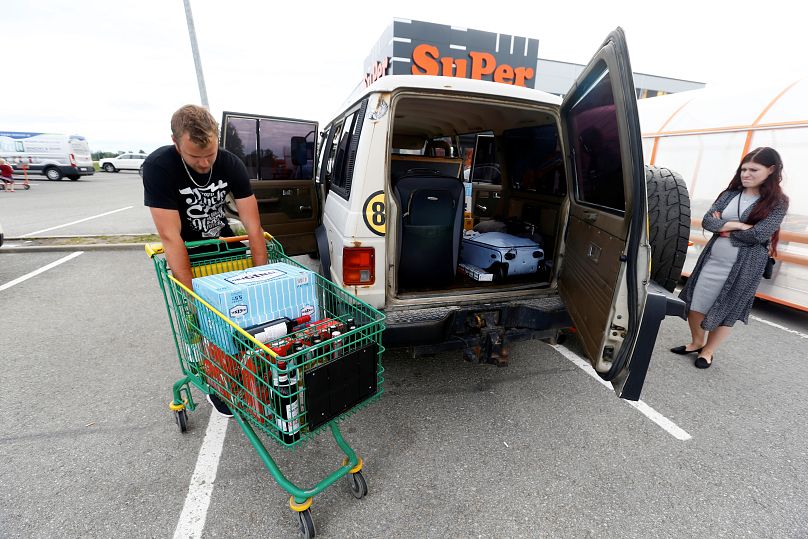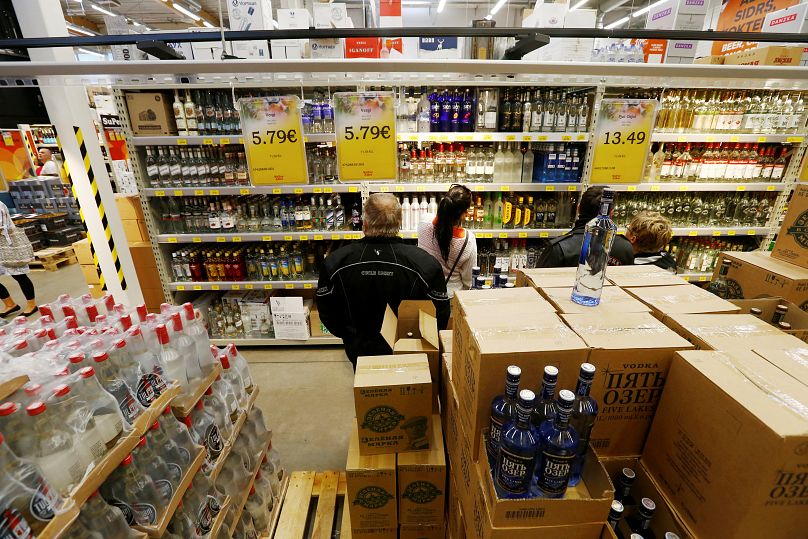A booze tax war has broken out between Baltic neighbours Latvia and Estonia, who are among the EU’s biggest consumers of alcohol.
An alcohol tax war has broken out between Baltic neighbours Latvia and Estonia, who are among the EU’s biggest consumers of alcohol.
First, a 25% alcohol duty cut came into force in Estonia on July 1, in a bid to stop people from travelling to Latvia to buy a cheap drink.
Now Latvia, keen to protect its booze trade on the border with Estonia, made a 15% reduction of its own.
It’s a temporary cut until February 29 next year that means Latvia remains cheaper for alcohol than Estonia.
It has highlighted a dilemma at the heart of the governments in Tallinn and Riga: do you slash tax on alcohol to help businesses and cross-border trade or keep duty high to protect people from the health dangers linked to drinking too much?
But the booze tax tit-for-tat is more than just a domestic issue. It calls into question whether limits are needed on how much alcohol can be allowed to freely flow across the borders of the EU’s single market.
Happy hour? How much does alcohol cost in Estonia and Latvia?
In 2018, the average salary of an Estonian was enough to buy 365 litres of beer or 56 litres of spirits, according to estimates by the Estonian Institute of Economic Research. With the same amount, a Latvian could instead buy 770 litres of beer or 89 litres of spirits.
In February last year, a half-litre bottle of Absolut vodka (40%) cost €10.99 in Estonia and €7.99 in Latvia.
The World Health Organization ranks both countries low in terms of their progress to introduce pricing policies that could help to cut consumption and reduce the harmful effects of alcohol.
Sobering statistics: the value of Latvia’s booze border trade
Large stores specialising in the sale of spirits have grown on Latvia's frontier with Estonia and Reuters estimates the cross-border trade is worth €45 million to Riga.
But cutting alcohol taxes is thought to be more costly, depriving state coffers of €70 million in income.
Nevertheless, doing nothing as Estonia cuts its taxes on strong alcohol — and thereby discouraging its citizens from travelling to Latvia for cheap drink — would mean a hit of €92 million, according to the government in Riga.
How bad is Baltic drinking compared with the rest of Europe?
Alcohol consumption in the three Baltic countries — Estonia, Latvia and Lithuania — is traditionally high and above the EU average.
On the face of it, therefore, cutting excise duty on booze might seem the opposite of what is required.
Indeed it goes against the trend of other EU governments. Meanwhile, WHO recommends increasing excise duties as a tool for combating the harm of alcohol abuse.
Lithuania was the biggest alcohol-consuming country in Europe, according to WHO statistics from 2016.
Latvia and Estonia were in the top ten.
Since then Vilnius has launched a crackdown, banning all forms of alcohol advertising, increasing taxes and the legal age for drinking.
Estonia has also made progress with alcohol consumption hitting a 10-year low in 2018 following government efforts to address the problem.
Its actions included increased taxes on beer by 90% in 2017.
The hangover of increasing taxes
The side effect of the hike was that it increased cross-border trade with Latvia as Estonians sought cut-price alcohol there.
That meant while taxes were increased, the amount flowing into Tallinn’s state coffers was less than expected.
Another knock-on was that it dissuaded Finns from crossing to Estonia for cheap booze.
Then, in the run-up to Estonia’s parliamentary election in March this year, the public debate switched to the idea of lowering alcohol taxes and recovering the money that had been lost over the border to Latvia.
On July 1, a 25% cut came into force, prompting this month’s retaliation from neighbours Latvia.
What do the experts say?
“It is a troubling situation and at least partly we (Estonia) have caused it ourselves,” Lauri Beekmann, executive director of Nordic Alcohol and Drug Policy Network, told Euronews.
“The beer tax increase (in 2017) was clearly too quick and too steep. Raising alcohol taxes is an effective measure but it is not an absolute measure.
“If there is a neighbouring country where the income level is quite a bit lower and prices are lower as well, you have to consider that.
“We have been on the other side of that issue for 15 years with Finland when Finns have brought quite a significant amount to our state budget. Unfortunately, we seemed to forget that experience and are now in a similar situation.
“Latvia´'s move is difficult to understand as they now think only about money, which is a really big problem for their good neighbour, so it’s not very diplomatic, if I may say so.
“But the overall alcohol policy in Estonia has improved a lot.”
What is the best way forward?
“As alcohol policy advocates, we consider the key to be in the hands of the EU, as cross-border trade with alcohol cannot be solved by member states alone,” continued Beekmann.
“Finland is that much richer than Estonia, there is no way we can harmonise tax levels by ourselves. Latvia is quite a bit behind Estonia and interest in prices on the other side will remain anyway.
“Sure, cross-border trade is part of the EU. But with excised goods such as alcohol, which is 'no ordinary commodity', cross-border trade causes serious problems.
“The issue in our mind is in the current indicative guide levels for alcohol — in other words, how much alcohol people can bring over the border.
“At the moment the regulation is rather ridiculous and member states have no means to tackle it.
“And the result is now seen at the Estonian-Latvian border. Also at the Finish-Estonian border.
“That’s why we, Nordic Alcohol and Drug Policy Network, urge these governments to cooperate and not to compete and focus on working towards a common message to Brussels.”
The EU says countries can set limits on how much alcohol can be brought into a country, but the ceilings must be at least 10 litres of spirits; 90 litres of wine; or 110 litres of beer.
What do Latvia and Estonia say?
In Estonia and Latvia, the statements given to Euronews suggest some conflict between ministries.
Tanel Kiik, from Estonia’s social affairs ministry, said: “The goal of lowering alcohol excise duty is to reverse the border trade, but the health and quality of life of Estonian people is more important than that.
“Reducing alcohol excise duty is an important risk to public health and can have unwanted consequences if alcohol consumption is to rise again.”
A statement sent to Euronews by Latvia’s health ministry reads: “The reduction of excise tax, thus making alcohol more accessible to the population, was not supported and was strongly opposed by the Ministry of Health of the Republic of Latvia.
“In the view of the Ministry, the decision to reduce the excise tax was taken hastily and without considering all the negative long-term consequences.”













